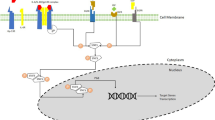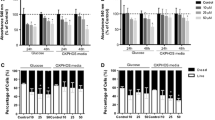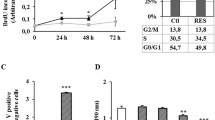Abstract
Resveratrol is a natural polyphenolic compound and has been shown to exhibit cardio-protective as well as anti-neoplastic effects on various types of cancers. However, the exact mechanism of its anti-tumor effect is not clearly defined. Resveratrol has been shown to have strong hypolipidemic effect on normal adipocytes and as hyper-lipogenesis is a hallmark of cancer cell physiology, the effect of resveratrol on lipid synthesis in cancer stem-like cells (CD24−/CD44+/ESA+) that were isolated from both ER+ and ER− breast cancer cell lines was examined. The authors found that resveratrol significantly reduced the cell viability and mammosphere formation followed by inducing apoptosis in cancer stem-like cells. This inhibitory effect of resveratrol is accompanied by a significant reduction in lipid synthesis which is caused by the down-regulation of the fatty acid synthase (FAS) gene followed by up-regulation of pro-apoptotic genes, DAPK2 and BNIP3. The activation of apoptotic pathway in the cancer stem-like cells was suppressed by TOFA and by Fumonisin B1, suggesting that resveratrol-induced apoptosis is indeed through the modulation of FAS-mediated cell survival signaling. Importantly, resveratrol was able to significantly suppress the growth of cancer stem-like cells in an animal model of xenograft without showing apparental toxicity. Taken together, the results of this study indicate that resveratrol is capable of inducing apoptosis in the cancer stem-like cells through suppression of lipogenesis by modulating FAS expression, which highlights a novel mechanism of anti-tumor effect of resveratrol.





Similar content being viewed by others
Abbreviations
- FAS:
-
Fatty acid synthase
- ER+:
-
Estrogen receptor positive
- ER−:
-
Estrogen receptor negative
- DAPK2:
-
Death associated kinase 2
- BNIP3:
-
BCL2/adenovirus E1B 19 kDa protein-interacting protein 3
- TRAIL:
-
Tumor necrosis factor-related apoptosis-inducing ligand
- ACC:
-
Acetyl-CoA carboxylase
- TOFA:
-
5-(Tetradecyloxy)-2-furoic acid
- qRT-PCR:
-
Quantitative real-time PCR
References
Baur JA, Sinclair DA (2006) Therapeutic potential of resveratrol: the in vivo evidence. Nat Rev Drug Discov 5:493–506
Pervaiz S (2003) Resveratrol: from grapevines to mammalian biology. FASEB J 17:1975–1985
Aggarwal BB, Shishodia S (2006) Molecular targets of dietary agents for prevention and therapy of cancer. Biochem Pharmacol 71:1397–1421
Levi F, Pasche C, Lucchini F, Ghidoni R, Ferraroni M, La Vecchia C (2005) Resveratrol and breast cancer risk. Eur J Cancer Prev 14:139–142
Das S, Khan N, Mukherjee S et al (2008) Redox regulation of resveratrol-mediated switching of death signal into survival signal. Free Radic Biol Med 44:82–90
Lin JK, Tsai SH (1999) Chemoprevention of cancer and cardiovascular disease by resveratrol. Proc Natl Sci Counc Repub China B 23:99–106
Renaud S, de Lorgeril M (1992) Wine, alcohol, platelets, and the French paradox for coronary heart disease. Lancet 339:1523–1526
Szkudelska K, Nogowski L, Szkudelski T (2009) Resveratrol, a naturally occurring diphenolic compound, affects lipogenesis, lipolysis and the antilipolytic action of insulin in isolated rat adipocytes. J Steroid Biochem Mol Biol 13:17–24
Athar M, Back JH, Tang X, Kim KH, Kopelovich L, Bickers DR, Kim AL (2007) Resveratrol: a review of preclinical studies for human cancer prevention. Toxicol Appl Pharmacol 224:274–283
Bishayee A (2009) Cancer prevention and treatment with resveratrol: from rodent studies to clinical trials. Cancer Prev Res 2:409–418
Jang M, Cai L, Udeani GO et al (1997) Cancer chemopreventive activity of resveratrol, a natural product derived from grapes. Science 275:218–220
Banerjee S, Bueso-Ramos C, Aggarwal BB (2002) Suppression of 7,12-dimethylbenz(a)anthracene-induced mammary carcinogenesis in rats by resveratrol: role of nuclear factor-kappaB, cyclooxygenase 2, and matrix metalloprotease 9. Cancer Res 62:4945–4954
Harper CE, Patel BB, Wang J, Arabshahi A, Eltoum IA, Lamartiniere CA (2007) Resveratrol suppresses prostate cancer progression in transgenic mice. Carcinogenesis 28:1946–1953
Kuhajda FP (2000) Fatty-acid synthase and human cancer: new perspectives on its role in tumor biology. Nutrition 16:202–208
Alo’ PL, Visca P, Marci A, Mangoni A, Botti C, Di Tondo U (1996) Expression of fatty acid synthase (FAS) as a predictor of recurrence in stage I breast carcinoma patients. Cancer 77:474–482
Milgraum LZ, Witters LA, Pasternack GR, Kuhajda FP (1997) Enzymes of the fatty acid synthesis pathway are highly expressed in in situ breast carcinoma. Clin Cancer Res 3:2115–2120
Rashid A, Pizer ES, Moga M et al (1997) Elevated expression of fatty acid synthase and fatty acid synthetic activity in colorectal neoplasia. Am J Pathol 150:201–208
Swinnen JV, Roskams T, Joniau S et al (2002) Overexpression of fatty acid synthase is an early and common event in the development of prostate cancer. Int J Cancer 98:19–22
Menendez JA, Lupu R (2007) Fatty acid synthase and the lipogenic phenotype in cancer pathogenesis. Nat Rev Cancer 7:763–777
Migita T, Ruiz S, Fornari A et al (2009) Fatty acid synthase: a metabolic enzyme and candidate oncogene in prostate cancer. J Natl Cancer Inst 101:519–532
Bandyopadhyay S, Zhan R, Wang Y et al (2006) Mechanism of apoptosis induced by the inhibition of fatty acid synthase in breast cancer cells. Cancer Res 66:5934–5940
Liu H, Liu Y, Zhang JT (2008) A new mechanism of drug resistance in breast cancer cells: fatty acid synthase overexpression-mediated palmitate overproduction. Mol Cancer Ther 7:263–270
Furuta E, Pai SK, Zhan R et al (2008) Fatty acid synthase gene is up-regulated by hypoxia via activation of Akt and sterol regulatory element binding protein-1. Cancer Res 68:1003–1011
Furuta E, Okuda H, Kobayashi A, Watabe K (2010) Metabolic genes in cancer: their roles in tumor progression and clinical implications. Biochim Biophys Acta 1805:141–152
Minn AJ, Gupta GP, Siegel PM et al (2005) Genes that mediate breast cancer metastasis to lung. Nature 436:518–524
Al-Hajj M, Wicha MS, Benito-Hernandez A et al (2003) Prospective identification of tumorigenic breast cancer cells. Proc Natl Acad Sci USA 100(7):3983–3988
Li C, Heidt DG, Dalerba P et al (2007) Identification of pancreatic cancer stem cells. Cancer Res 67(3):1030–1037
Fillmore CM, Kuperwasser C (2008) Human breast cancer cell lines contain stem-like cells that self-renew, give rise to phenotypically diverse progeny and survive chemotherapy. Breast Cancer Res 10(2):R2
Li C, Lee CJ, Simeone DM (2009) Identification of human pancreatic cancer stem cells. Methods Mol Biol 568:161–173
Huang TT, Lin HC, Chen CC et al (2010) Resveratrol induces apoptosis of human nasopharyngeal carcinoma cells via activation of multiple apoptotic pathways. J Cell Physiol [Epub ahead of print]
Vanamala J, Reddivari L, Radhakrishnan S, Tarver C (2010) Resveratrol suppresses IGF-1 induced human colon cancer cell proliferation and elevates apoptosis via suppression of IGF-1R/Wnt and activation of p53 signaling pathways. BMC Cancer 10:238
Lee MH, Choi BY, Kundu JK et al (2009) Resveratrol suppresses growth of human ovarian cancer cells in culture and in a murine xenograft model: eukaryotic elongation factor 1A2 as a potential target. Cancer Res 69(18):7449
Boissy P, Andersen TL, Abdallah BM et al (2005) Resveratrol inhibits myeloma cell growth, prevents osteoclast formation, and promotes osteoblast differentiation. Cancer Res 65(21):9943–9952
Jiang H, Shang X, Wu H et al (2009) Resveratrol downregulates PI3K/Akt/mTOR signaling pathways in human U251 glioma cells. J Exp Ther Oncol 8(1):25–33
Hwang J-T, Kwon DY, Park OJ, Kim (2008) Resveratrol protects ROS-induced cell death by activating AMPK in H9c2 cardiac muscle cells. Genes Nutr 2(4):323–326. doi:10.1007/s12263-007-0069-7
Lin JN et al (2010) Resveratrol modulates tumor cell proliferation and protein translation via SIRT1-dependent AMPK activation. J Agric Food Chem 58(3):1584–1592
Ahmad N, Adhami VM, Afaq F, Feyes DK, Mukhtar H (2001) Resveratrol causes WAF-1/p21-mediated G(1)-phase arrest of cell cycle and induction of apoptosis in human epidermoid carcinoma A431 cells. Clin Cancer Res 7:1466–1473
Bai Y, Mao QQ, Qin J et al (2010) Resveratrol induces apoptosis and cell cycle arrest of human T24 bladder cancer cells in vitro and inhibits tumor growth in vivo. Cancer Sci 101:488–493
Gagliano N, Aldini G, Colombo G et al (2010) The potential of resveratrol against human gliomas. Anticancer Drugs 21:140–150
Wang J, He D, Zhang Q, Han Y, Jin S, Qi F (2009) Resveratrol protects against Cisplatin-induced cardiotoxicity by alleviating oxidative damage. Cancer Biother Radiopharm 24:675–680
Bonnet D, Dick JE (1997) Human acute myeloid leukemia is organized as a hierarchy that originates from a primitive hematopoietic cell. Nat Med 3:730–737
Hope KJ, Jin L, Dick JE (2004) Acute myeloid leukemia originates from a hierarchy of leukemic stem cell classes that differ in self-renewal capacity. Nat Immunol 5:738–743
Marx J (2007) Molecular biology. Cancer’s perpetual source? Science 317:1029–1031
Vitrac X, Desmoulière A, Brouillaud B et al (2003) Distribution of (14C)-trans-resveratrol, a cancer chemopreventive polyphenol, in mouse tissues after oral administration. Life Sci 72:2219–2233
Hamada J, Nakata D, Nakae D et al (2001) Increased oxidative DNA damage in mammary tumor cells by continuous epidermal growth factor stimulation. J Natl Cancer Inst 93:214–219
Whyte L, Huang YY, Torres K, Mehta RG (2007) Molecular mechanisms of resveratrol action in lung cancer cells using dual protein and microarray analyses. Cancer Res 67:12007–12017
Zhang J (2006) Resveratrol inhibits insulin responses in a SirT1-independent pathway. Biochem J 397:519–527
Vazquez-Martin A, Colomer R, Brunet J, Lupu R, Menendez JA (2008) Overexpression of fatty acid synthase gene activates HER1/HER2 tyrosine kinase receptors in human breast epithelial cells. Cell Prolif 41:59–85
Knowles LM, Yang C, Osterman A, Smith JW (2008) Inhibition of fatty-acid synthase induces caspase-8-mediated tumor cell apoptosis by up-regulating DDIT4. J Biol Chem 283:31378–31384
Bandyopadhyay S, Pai SK, Watabe M et al (2005) FAS expression inversely correlates with PTEN level in prostate cancer and a PI 3-kinase inhibitor synergizes with FAS siRNA to induce apoptosis. Oncogene 24:5389–5395
Acknowledgments
This study was supported by the National Institutes of Health [R01CA124650 and R01CA129000], the Department of Defense, and Susan G. Komen Foundation.
Author information
Authors and Affiliations
Corresponding author
Rights and permissions
About this article
Cite this article
Pandey, P.R., Okuda, H., Watabe, M. et al. Resveratrol suppresses growth of cancer stem-like cells by inhibiting fatty acid synthase. Breast Cancer Res Treat 130, 387–398 (2011). https://doi.org/10.1007/s10549-010-1300-6
Received:
Accepted:
Published:
Issue Date:
DOI: https://doi.org/10.1007/s10549-010-1300-6




